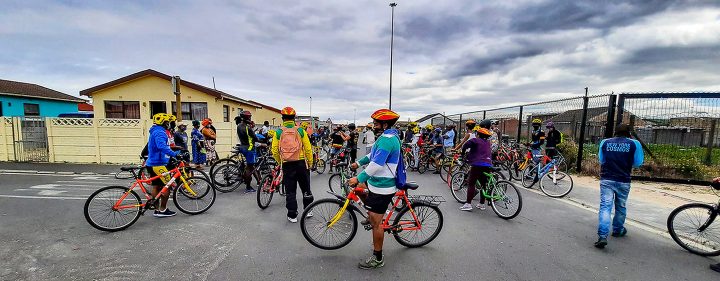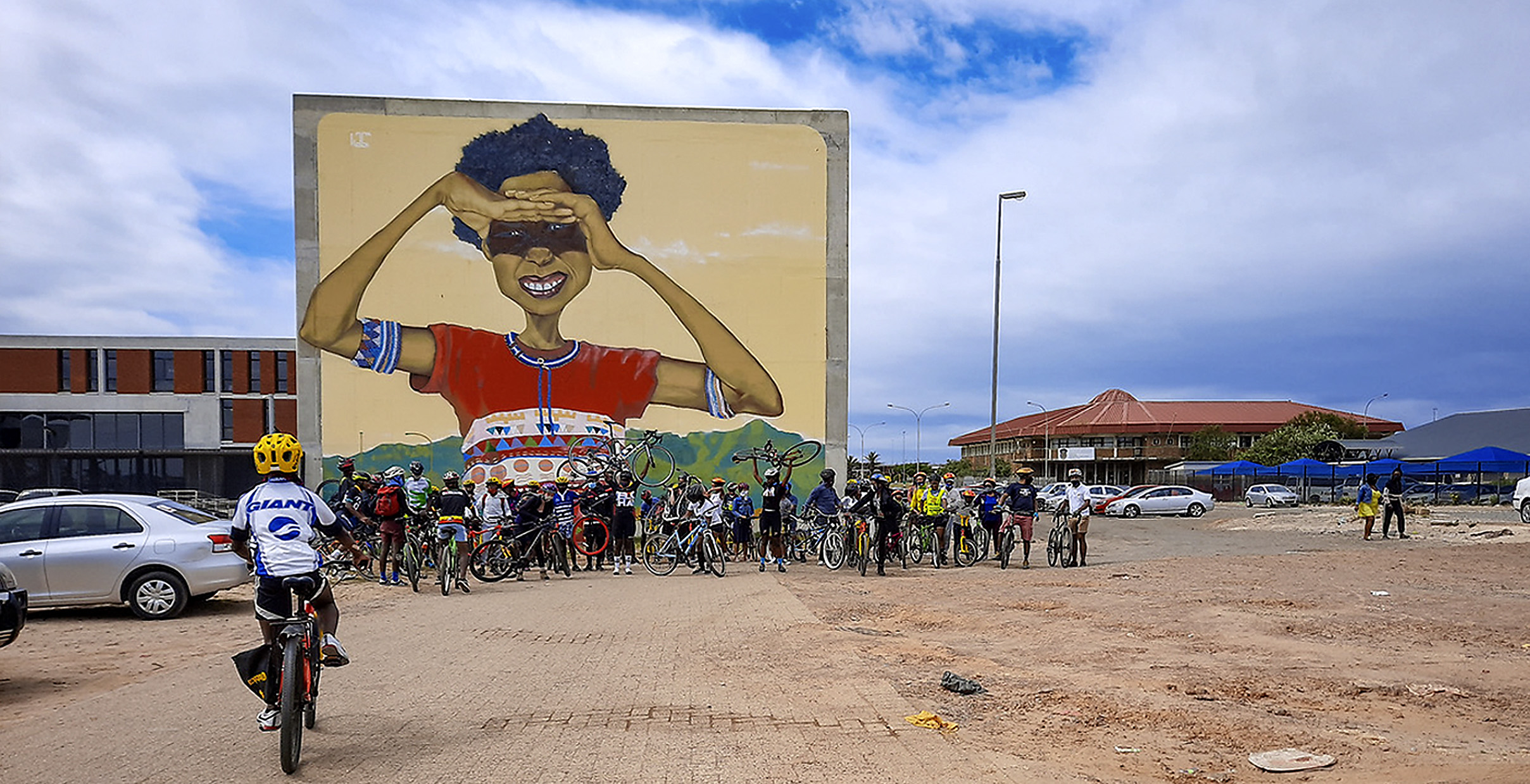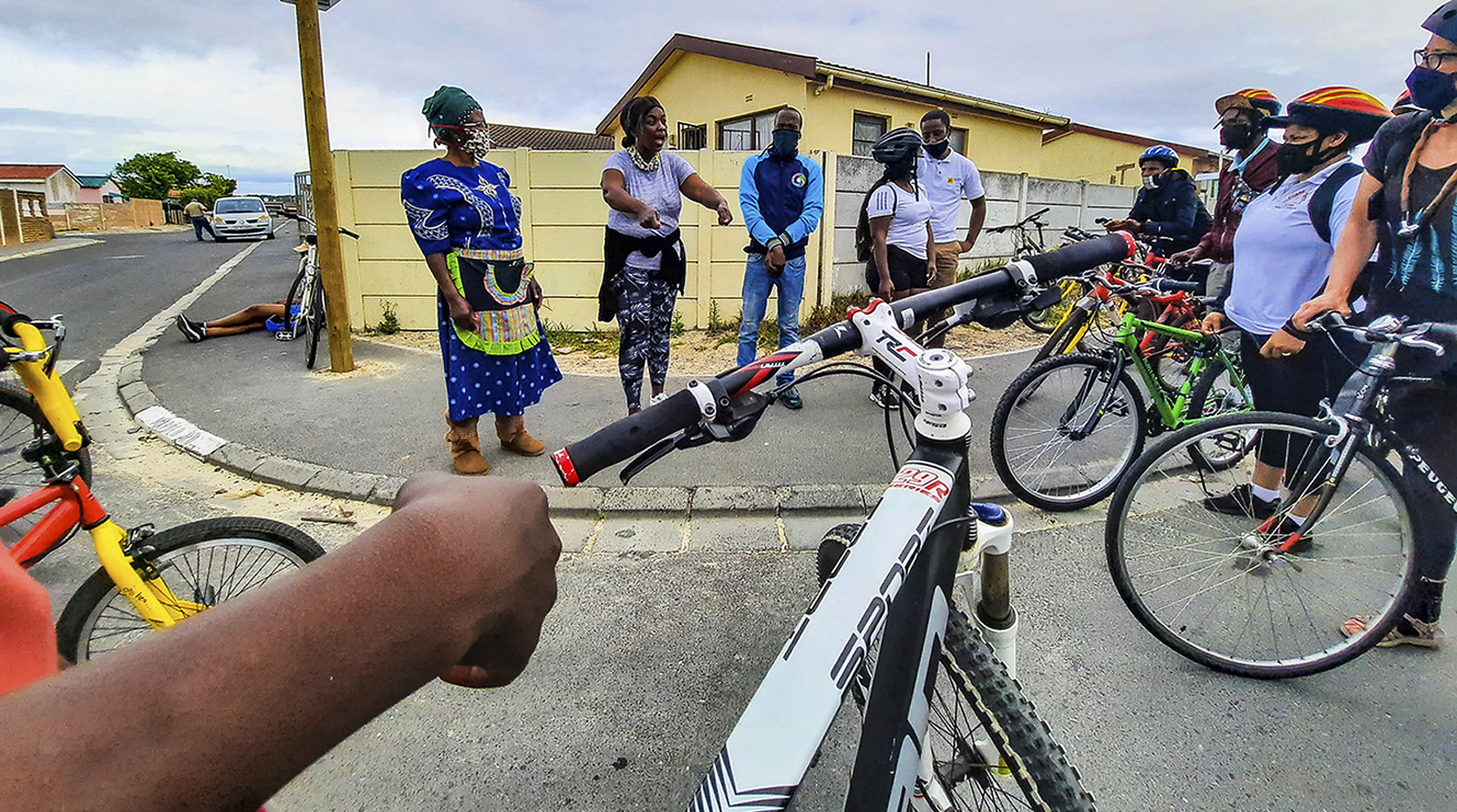Maverick Citizen Op-Ed
Experiencing a vibrant Cape Town from your bicycle saddle

Bicycle advocacy is gaining momentum as an activist movement for breaking down barriers and linking previously segregated communities across Cape Town.
On Saturday morning, I found myself surrounded by bicycles on a small street of Khayelitsha listening to the story behind the Ekuphumleni Community Action Network (CAN). The street had effectively shut down and turned into a small stage where people listened attentively and mingled while observing physical distancing rules.

The group stops for a photo in front of Boniswa, the giant mural outside the Isivivana Centre in Khayelitsha. (Photo: Shaun Doch)
A few cars made their way through the crowd slowly and with patience, understanding that in this context, they were not the priority and that respecting the majority of users of the space was the only way to get through. At that point, Sindile Mavundla, who would then lead us on a social bicycle ride, joked that they shut down the street regularly for different functions and that “drivers are used to it”.
Sindile then gave us some basic instructions for the group ride: “Try to stay in a single file, listen to the marshals, and remember we all have a right to cycle on the street.” And with that, over 60 bicycles with people of all ages and shapes got on the road and began a social ride to connect, enjoy and claim our right to the road.
This reminded me of the concept of cycling “colectivos” in Bogotá, Colombia, which for the past decade or so have grown in size and diversity. They emerged as a grassroots effort to promote cycling, some with a strong political agenda (feminist, environmentalist groups, and so on), others with a geographic identity based on their neighbourhood, but all in all, wanting to cycle together because they love bicycles (and because in a city like Bogota, it is much safer to ride in groups).
What I am seeing emerge in places like Khayelitsha and Langa is the kind of activism that seemed a far away dream in the early 2010s when I entered the bicycle advocacy space. Back then, the big ride that made the headlines was Moonlight Mass in Sea Point and the CBD of Cape Town. Connecting to other parts of the city seemed impossible, because, in a literal sense, it was. Apartheid planning succeeded in cementing barriers through highways and forced displacements. Cycling across the city was not a realistic goal despite dreams and efforts trying to prove the contrary.
During lockdown, we have had no choice but to look closer to our neighbourhoods and it turns out that looking inwards is what is required to connect with the rest of the city. In other words, promoting those “collective” efforts and energy that respond to a local desire and a growing demand turns out to be the recipe to garner the much-desired “critical mass”. Moreover, it turns out that bicycles do not only help movement, but also nurture other forms of expression and communication.

Deborah Odumuko from the Ekuphumleni Community Action Network welcomes cyclists and shares her experience running a community kitchen with family and neighbours. (Photo: Shaun Doch)
That was clear and palpable during the social Community Action Network (CAN) ride on Saturday 14 November between Ekuphumleni and Tafelsig — with some of us cycling from Langa and the Cape Town CBD.
The ride started at Umthawelanga Primary on Walter Sisulu Road and took us to Harare where a group of young girls performed an impressive, well-choreographed dance series, with a clear favourite called “Hamba Corona” featuring hand washing and elbow raising, demonstrating how to shield oneself from the virus. We then cycled to Tafelsig CAN where Joanie Fredericks and neighbours have made their street a hub of solidarity where all sorts of celebrities have visited in the past few months; and finally to Khaltsha Cycles, a bicycle shop and the brainchild of Sindile Mavundla and Juma Mkwela who have recently opened their doors to the public, before returning to our starting point.
At every stop as people parked their bicycles and created a circle around our guests and performers, a picture-perfect scene emerged, one of movement – both of the physical form and a symbol of what happens when the spirit of creativity, solidarity, entrepreneurship and of course, bicycles, are all in the mix. The work Khaltsha Cycles has done in facilitating and coordinating the distribution of bicycles to various CANs around Cape Town has shown this since the outset of lockdown.
At around 2pm, as we got on our bicycles for the long ride back to town, my cycling companion reflected: “imagine we didn’t have to ride 35km to experience a vibrant Cape Town”… one where people use their streets to connect, share food, space and dreams. Even though distances may not be physically shortened and it might take years to shift the way our city was designed, there is an enormous power in uniting through the things we already share: the bicycle is one of those! DM/MC
Marcela Guerrero Casas is co-founder and former managing director, Open Streets Cape Town.

















 Become an Insider
Become an Insider
Comments - Please login in order to comment.